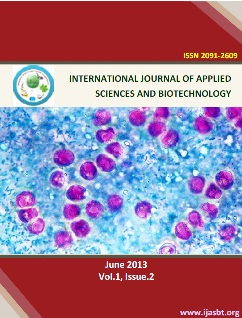Genotype by environment interaction and yield stability analysis of quality protein maize genotypes in Terai Region of Nepal
DOI:
https://doi.org/10.3126/ijasbt.v1i2.8202Keywords:
Quality protein maize, GGE biplot, G x E interaction, yield stabilityAbstract
Grain yield stability for the new maize genotypes is an important target in maize breeding programs. The main objective of this study was to identify stable high yielding quality protein maize (QPM) genotypes under various locations and years in terai region of Nepal. Six quality protein maize genotypes along with Poshilo Makai-1 (Standard Check) and Farmer’s Variety (Local Check) were tested at three different locations namely Ayodhyapuri-2, Devendrapur, Madi, Chitwan; Rajahar-8, Bartandi, Rajahar, Nawalparasi; Mangalpur-2, Rampur, Chitwan during 2011 and 2012 spring and winter seasons under rainfed condition. The experiment was conducted using Randomized Complete Block Design with two replications in farmer’s fields. There was considerable variation among genotypes and environments for grain yield. The analysis of variance showed that mean squares of environments (E) was highly significant and genotypes (G) and genotype x environment interaction (GEI) were non significant. The genotypes S03TLYQ-AB02 and RampurS03FQ02 respectively produced the higher mean grain yield 5422±564 kg/ha and 5274±603 kg/ha across the locations. Joint regression analysis showed that RampurS03FQ02 and S03TLYQ-AB02 with regression coefficient 1.10 and 1.22 respectively are the most stable genotypes over the tested environments. The coefficient of determination (R2) for genotypes Rampur S03FQ02 and S03TLYQ-AB02 were as high as 0.954, confirming their high predictability to stability. Further confirmation from GGE biplot analysis showed that maize genotype S03TLYQ-AB02 followed by Rampur S03FQ02 were more stable and adaptive genotypes across the tested environments. Thus these genotypes could be recommended to farmers for general cultivation.
DOI: http://dx.doi.org/10.3126/ijasbt.v1i2.8202
Int J Appl Sci Biotechnol, Vol. 1(2): 75-79
Downloads
1008
557




